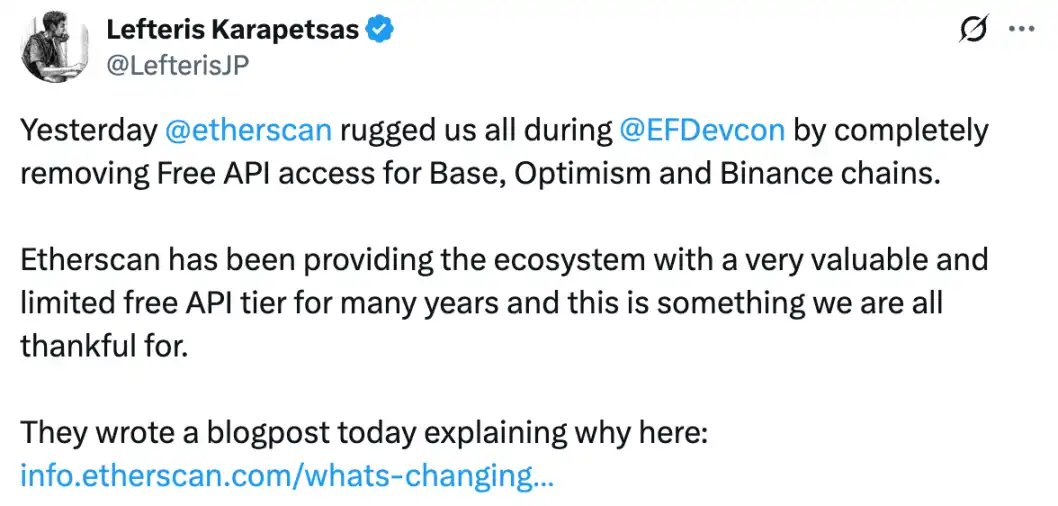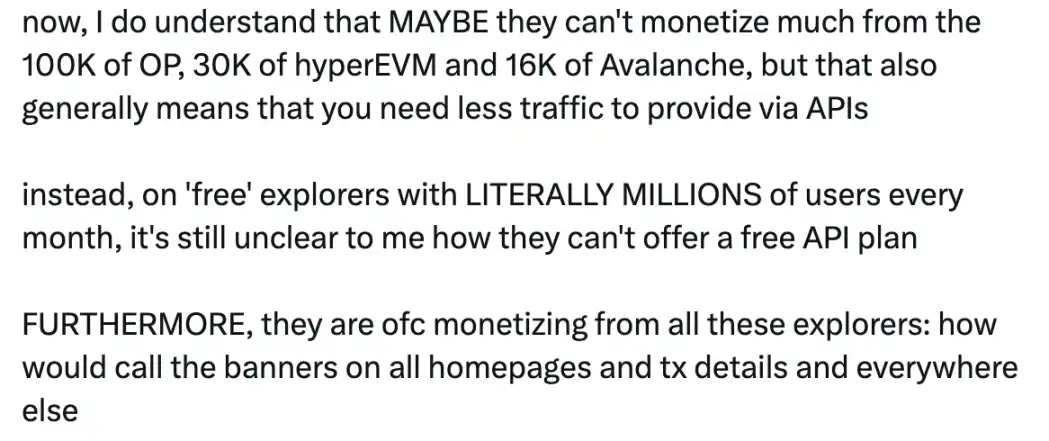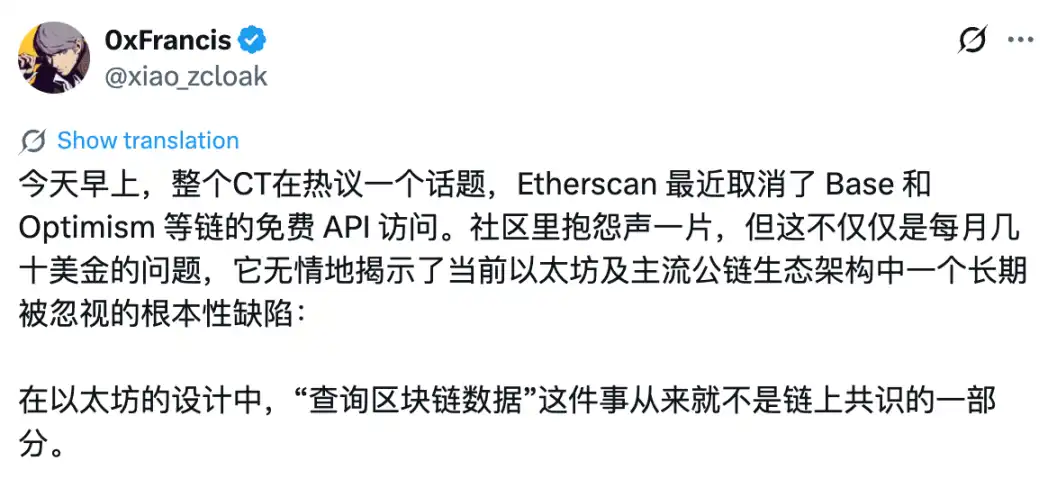Original Title: "Etherscan Canceled Several Free APIs, Uncovering Some Issues We Never Considered"
Original Author: Eric, Foresight News
On November 23, Lefteris Karapetsas, the founder of the open-source portfolio tracker Rotki, tweeted his frustration about Etherscan. He stated that Etherscan suddenly announced during Devcon that it would no longer provide free APIs for the Avalanche C-Chain, Base, BNB Chain, and OP Mainnet block explorers.
While he understands that providing free services can be quite stressful, he questioned whether they could have given a bit more notice or at least avoided making such an announcement during a major event when everyone is out of town, leaving no time to respond.

According to Etherscan's announcement, as the performance of chains gradually improves, the volume of data has also significantly increased, which has raised costs considerably. In this situation, they can no longer afford to provide all APIs for free and have reluctantly turned some originally free APIs into paid versions.
It is clear that the inability to continue offering free APIs for specific chains is likely due to a lack of sufficient funding or resource support.
In the end, this individual was still puzzled, wondering if Base, OP Mainnet, and BNB Chain really lacked the funds to support such an important service, aside from Avalanche.
However, opposing voices quickly followed, with Jack, the founder of Routescan and operator of the Avalanche block explorer Snowtrace, being the first to respond. Jack provided some data that might only be known within the industry:
· Etherscan charges the chains it supports approximately $1.5 million to $2 million annually, although some only cost around $300,000 and provide very basic data;
· For those chains that have already paid, Etherscan only offers 5 RPS (requests per second) of free API, and for more, the monthly subscription fee can go up to $899;
· Last month, the independent visitor counts for Etherscan's various chain explorers were: OP Mainnet, 102,000; BNB Chain, 2.5 million; Base, 1 million; HyperEVM, 30,000; Avalanche, 16,000. Etherscan itself had 4 million.

The CEO's implication is that charging for a small number of APIs is indeed due to financial strain, not because they are unwilling to earn more money. Some chains have not paid, and they have already been generous by providing free services for a while, so there is no need for further complaints.
There isn't much more to discuss about this issue; some people feel that Etherscan is greedy, while others believe that commercial behavior is justifiable. However, the other discussions that emerged from this event are quite interesting.
Firstly, this incident made the author aware of the existence of an ecosystem alliance called VERA, which promotes convenient, unified, and open access to EVM smart contract source code, as well as the Open Labels Initiative, which advocates for the standardization of EVM address labeling frameworks and data models. The essence of what these two organizations want to achieve is to support the accessibility of blockchain data, especially verification.
The Open Labels Initiative retweeted Lefteris Karapetsas's complaint tweet, stating that they have been working to prevent such situations from occurring with overly dependent centralized on-chain data providers over the past year, and they believe that such important infrastructure should not be monopolized but should be co-built.
Organizations like sourcefify.eth, the Ethereum data visualization platform growthepie, the open-source block explorer Blockscout, and the previously mentioned Routescan are all contributing to the readability and accessibility of Ethereum data.
According to Reserve Protocol DeFi engineer Akshat Mittal, Etherscan has not participated in these initiatives. Is it for commercial interests? No one knows, but even if it is, it is not unjustifiable. The Ethereum ecosystem will always have some who uphold open-source culture and reject excessive commercialization; this is not about good or bad, but rather the diversity of the ecosystem. For-profit organizations can ensure service quality, and open-source products will also have their place.
In addition, 0xFrancis, the founder of zCloak Network, who has recently been generous in praising IC, made another comparison between IC and Ethereum.

0xFrancis stated that Ethereum does not consider "querying block data" as part of its consensus. Developing DApps must rely on third-party RPC services, and if RPC nodes collectively go offline, the chain will continue to operate, but it will become "unreadable."
On a deeper level, if centralized RPC nodes or websites like Etherscan provide false data, it can easily mislead users. IC treats querying itself as part of the protocol; when someone initiates a query request, it is executed uniformly through the ICP node network and returns cryptographically verified data, ensuring data accuracy.
0xFrancis's points are not without merit, and this can serve as a typical case of IC being overly advanced. The debate surrounding Etherscan's fees is also a classic discussion about centralization versus decentralization. However, could it be that Ethereum's imperfections and the need for commercial components have actually driven the prosperity of its ecosystem?
免责声明:本文章仅代表作者个人观点,不代表本平台的立场和观点。本文章仅供信息分享,不构成对任何人的任何投资建议。用户与作者之间的任何争议,与本平台无关。如网页中刊载的文章或图片涉及侵权,请提供相关的权利证明和身份证明发送邮件到support@aicoin.com,本平台相关工作人员将会进行核查。




